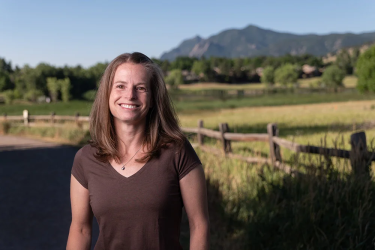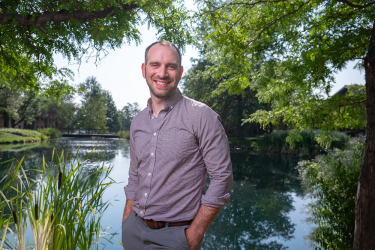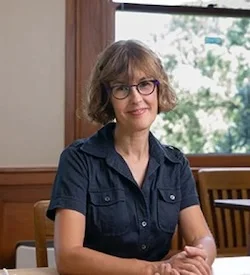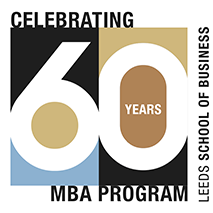Advancing New Ideas
The following three faculty members exemplify Leeds’ commitment to world-class teaching and research. They continue to earn awards, media attention and accolades, but all three would humbly say their students are the rising stars, ready to take on global challenges. Their guiding principles may seem basic but are profound: The world is your classroom. Start the conversation. Never stop learning.
That’s how they’re making a difference, and that’s how they’re moving the world forward.
SARAH ZECHMAN
Professor of Accounting
Tisone Memorial Fellow

For Sarah Zechman, accounting is anything but mechanical.
Issues like environmental, social and governance (ESG) reporting, blockchain reporting and big data, and corporations’ increasing use of social media are reshaping the field almost daily.
Zechman dispels the notion that accounting “equates to bookkeeping (boring!) and that accounting research is the study of ‘boring.’” She exposes students to fresh perspectives on fundamental issues, current events and trends.
After starting at Leeds in 2015 and being appointed senior associate dean of faculty in the summer of 2024, Zechman praises the school’s leadership for promoting a culture of curiosity. “Faculty are encouraged to push boundaries, collaborate across fields and reevaluate previously accepted truths.”
Two of Zechman’s projects involve studying why investors back special purpose acquisition companies despite their historically poor returns and how CEOs’ podcast appearances appear to mitigate bad news and boost brand loyalty.
Her research has been cited in prominent publications like the Wall Street Journal and Financial Times. Among her awards, Zechman twice received the Best Paper in Financial Accounting from the American Accounting Association, as well as receiving their Best Dissertation award.
“Accounting is guided by principles that require discretion and judgment—implemented by real people with their own agendas and incentives,” she said.
ASAF BERNSTEIN
Professor of Finance
Frank Schiff Faculty Scholar

Asaf Bernstein remembers what it’s like to feel bored and unseen in lectures. That’s why at the beginning of each semester, he makes sure he knows the name of each student in his classes, engaging them from day one in his undergraduate and graduate courses in finance and investment or when guiding PhD students on financial economics research.
Bernstein’s goal is to foster an inclusive connection and to help students develop practical skills, demystifying and clarifying complex financial topics.
Professional work in the real estate and corporate finance fields during pivotal events adds to his worldview, ranging from his experience of the 2007 subprime mortgage crisis to the 2010 “flash crash.” He also served as a senior academic advisor on climate issues to the Securities and Exchange Commission for a year. That knowledge enhances his research focus, which carefully looks at critical environmental goals to help inform the policies and regulations that address systemic financial risks. “History reveals how much we still don’t know,” Bernstein said.
His award-winning research has been featured in leading media, including the Washington Post, the Wall Street Journal and the New York Times.
Bernstein sees the Rocky Mountains as a constant source of inspiration. “You feel like you are at the frontiers, literally and metaphorically,” he said. “Working in the light and shadow of those peaks is both elevating and humbling. No matter what you do, you will always be small in their shadow, but there’s something awe-inspiring about looking up and seeing what heights can be reached.”
NATHALIE MOYEN
Professor of Finance
W.W. Reynolds Capital Markets Program Chair

Nathalie Moyen champions learning through real-world applications, partnering with MBA students in case discussions to foster decision-making. The approach has been wildly successful: In spring 2024, she was honored with the MBA Teaching Excellence Award and the Executive MBA Faculty Teaching Award.
“Students practice critical thinking skills by parsing out the important information from the noise. They actively listen to each other, and through class discussions, they make discoveries and connections together.”
Her research mirrors this teaching philosophy. In summer 2024, she collaborated with CU engineers and construction professionals to study the impact of safety investments on workforce injuries and firm performance among both private and public firms.
As the outgoing chair of the Leeds Finance Division and the incoming W.W. Reynolds Capital Markets Program Chair in fall 2024, Moyen is excited to teach the World of Business. The course uses gamification to help first-year undergraduates experience economic concepts at a “gut level.” By facing the challenges themselves, students then can understand “how our economic system allocates resources, how property rights may alleviate poverty and how individual freedoms stack up against externalities.”
The course emphasizes robust civic discourse; students lose points if they don’t pay serious attention to the merits of opposing views. Moyen believes it’s essential to know that reasonable minds can disagree, all the while supporting each student in finding their own personal values.







